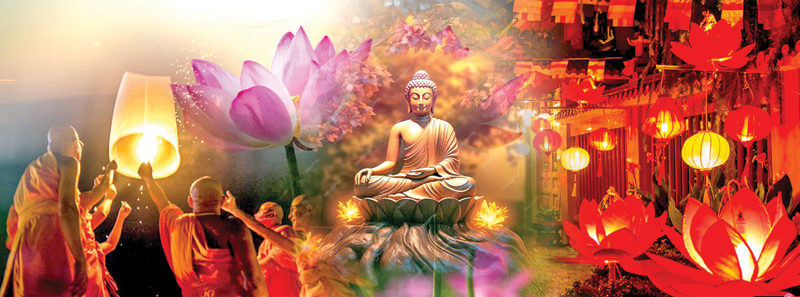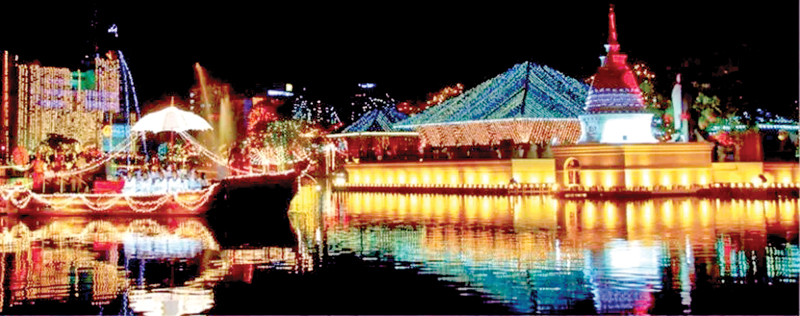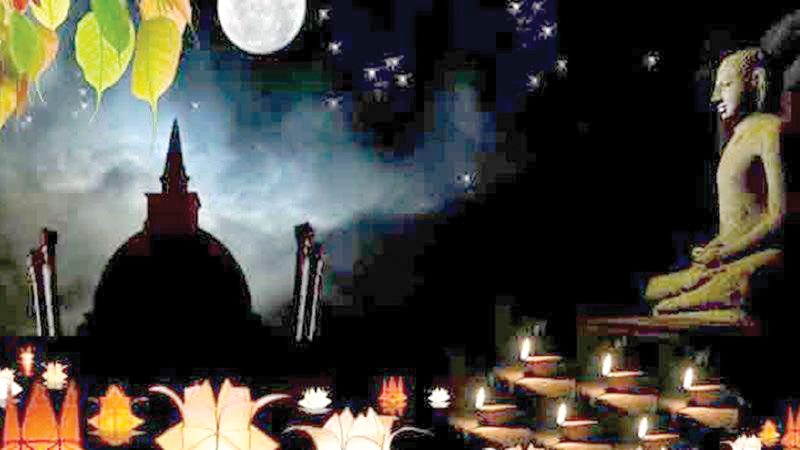Hard is it to be born a man; hard is the life of mortals. Hard is it to gain the opportunity of hearing the Sublime Truth, and hard to encounter is the arising of the Buddhas. (Dhammapada, Buddha Vagga)
 On May 23, Buddhists in Sri Lanka and all parts of the world will celebrate Vesak Full Moon Poya, which marks the Birth, Enlightenment and the Passing Away (Parinibbana) of the Buddha. It is the most important day in the international Buddhist calendar and is a holiday recognised by the United Nations (UN) on an initiative made by Sri Lanka’s former Foreign Minister Lakshman Kadirgamar.
On May 23, Buddhists in Sri Lanka and all parts of the world will celebrate Vesak Full Moon Poya, which marks the Birth, Enlightenment and the Passing Away (Parinibbana) of the Buddha. It is the most important day in the international Buddhist calendar and is a holiday recognised by the United Nations (UN) on an initiative made by Sri Lanka’s former Foreign Minister Lakshman Kadirgamar.
In Sri Lanka, the Cabinet of Ministers approved the proposal presented by the Minister of Buddhasasana, Religious and Cultural Affairs to conduct the State Vesak Festival from May 21 to 27, 2024 in the Matale district. The theme for the State Vesak festival for Sri Buddha year 2568 (2024) is “Let’s not look at what others have done and look at what we have done”. The opening ceremony of the festival is scheduled to be held at the premises of Dharmaraja Pirivena in Matale and the closing ceremony at Millawana Sri Sunandarama Temple premises in Pallepola Divisional Secretariat.
This year’s Vesak festival is even more significant for Sri Lankan Buddhists, as this is the first time that Vesak is being celebrated after the country has achieved a degree of political and economic stability. Judging by the record number of Dansals being held and pandals being erected, the people are once again feeling free to celebrate national festivals. This was indeed evident during the Sinhala and Tamil New Year festivities as well.

During the past few years, Vesak celebration was impacted by the Covid-19 pandemic and then the crippling economic crisis followed by a political upheaval. Nevertheless, Sri Lankans have always celebrated Vesak regardless of any difficulties they had to face personally or as a nation. After all, Vesak is in a way a celebration of the mind, even though the more material aspects also come to the fore.
The Buddha’s message is even more apt at challenging times such as these when the world is practically at war, in Europe, Middle East and Africa. Mental fortitude in the face of challenges is a cornerstone of Buddhism and we need such courage more than ever now. No problem is insurmountable if we follow Buddha’s timeless words, which still ring true even after 2,500 years.
“To avoid all evil, to cultivate good, and to cleanse one’s mind — this is the teaching of the Buddhas.” (Dhammapada, Buddha Vagga)
Our nation has been divided along ethnic, religious and political lines for many decades since Independence in 1948. These fractures had come to the fore in recent times, testing our will and very existence as a nation. We have gone through wars and insurgencies as a result. Contrast our fate with that of countries such as Singapore, which eschewed racial divisions and one can see where and why we failed.
Healthy sign
However, there have been many indications in recent times that the younger generation has no regard for these man-made divisions and even politics. Politicians can no longer divide them. They also respect all religions equally. This is a healthy sign that our future will be much brighter with them at the helm.
Vesak this year is most appropriate for spreading the message of unity, peace and reconciliation, the need of the hour. Today, the Nation is at a crossroads, facing a long, hard road ahead in order to rise Phoenix-like from the challenges. But this can be achieved in due course with unity and conviction of purpose, for which we can derive inspiration from the Buddha’s words or the Dahmma.
“A man is not versed in Dhamma because he speaks much. He who, after hearing a little Dhamma, realises its truth directly and is not heedless of it, is truly versed in the Dhamma.” (Dhammapada, Dhammatha Vagga)
We have to opt for unity and peace at this time instead of discord and rancour. We have the Herculean task of rebuilding the nation ahead of us. And the Buddha Dhamma offers ample guidance for such a process of healing and rebuilding that benefits all our peoples irrespective of communal, religious or political differences or beliefs.
The Buddha during one of His three visits to our island settled a dispute between two factions in Naga Deepa, stressing the importance of peace. His message of peace and unity for all Mankind resonates to this day, for His words are immortal and timeless.
The Buddha advocated compassion for all beings, human and animal and enunciated that hatred does not cease by hatred, but by love. “Arise! Do not be heedless! Lead a righteous life. The righteous live happily both in this world and the next.” (Lokavagga, The Dhammapada)
Buddha’s advice
Indeed, our political parties and the people must derive inspiration from the Buddha’s advice, settle their differences and come to an arrangement to save and rebuild the country at this juncture. Enmity and hatred will not take us anywhere. Restraint, patience and non-violence can solve a lot of problems in the long run. “One who, while himself seeking happiness, oppresses with violence other beings who also desire happiness, will not attain happiness hereafter.” (The Dhammapada, Dandavagga).
There are many such values that our society has lost sight of in the relentless pursuit of material wealth. This is not surprising in a highly commercialised world, where money is generally regarded as ‘everything’. In fact, the Vesak festival itself is commercialised to such an extent that many have forgotten its very purpose and foundation. This is true for most other religious festivals.
We see the glitter and glamour in the illuminations and the pandals but fail to turn the light inwards to our inner selves with a view to purifying our thoughts, words and deeds. We should see beyond the colourful decorations and strive to understand the Buddha, Dhamma and how it relates to our day-to-day lives.
The Buddha exhorted that affinity towards material things leads to constant suffering through Samsara. The Four Noble Truths and the Eightfold Path espoused by the Buddha point the way towards a permanent end to this suffering – Nibbana, the State of Supreme Bliss. “Do not follow a life of evil; do not live heedlessly; do not have false views; do not value worldly things. In this way one can get rid of suffering.” (Lokavagga, The Dhammapada).
While this is the ultimate goal of every Buddhist, it would be wrong to assume that Buddhism is a very complicated philosophy that offers nothing for our lay lives. The Buddha had plenty of advice to offer for lay persons who want to lead pious lives in their Samsaric journey. The Singalovada Sutta is entirely dedicated to advice for lay persons.
He made it clear that inner peace or cleansing the mind was the first step in this endeavour of finding an end to suffering. “The mind is hard to check. It is swift and wanders at will. To control it is good. A controlled mind is conducive to happiness.” (Chitta Vagga, The Dhammapada).
Thus, thoughts of peace and compassion should emanate from our minds at all times and a nation that collectively engages in this exercise will see peace, unity and progress in every sphere.
Vesak has always been, and always will be, a time for unity. It is not only Buddhists who take part in Vesak activities. It is truly a national event where the whole country comes together as one. Many Vesak dansalas, pandals and decorations are put up by organisations headed by non-Buddhists. Singers from all communities join hands to sing devotional songs for Vesak. In fact, some of the most well-known Buddhist songs, played repeatedly on radio stations during Vesak, have been performed by non-Buddhists. Non-Buddhists help their Buddhist neighbours with their Vesak decorations.
Respect other views
Such religious and communal unity is vital to the development of our country and Vesak is an occasion which reinforces these bonds. This is in accordance with the teachings of the Enlightened One, who advised His followers to respect other religions and their views.
Vesak, the Holiest Day for Buddhists, gives them another opportunity to begin life anew by adhering firmly to the Dhamma.
“He who practises the Dhamma abides in happiness with mind pacified; the wise man ever delights in the Dhamma.” (Pandithavagga, The Dhammapada).
The Dhamma has shown us how to lead fulfilled, pious lives without contaminating our minds with evil thoughts. Our nation has made a new start after many decades of bloodshed. Now, more than ever, there is a need to heal the wounds that have bedeviled this nation through love and compassion. There certainly is no better way than following the eternal words of the Buddha to achieve this noble objective.
“Of all the paths the Eightfold Path is the best; of all the truths the Four Noble Truths are the best; of all things passionlessness is the best: of men the Seeing One (the Buddha) is the best.” (Maggavagga, Dhammapada)










